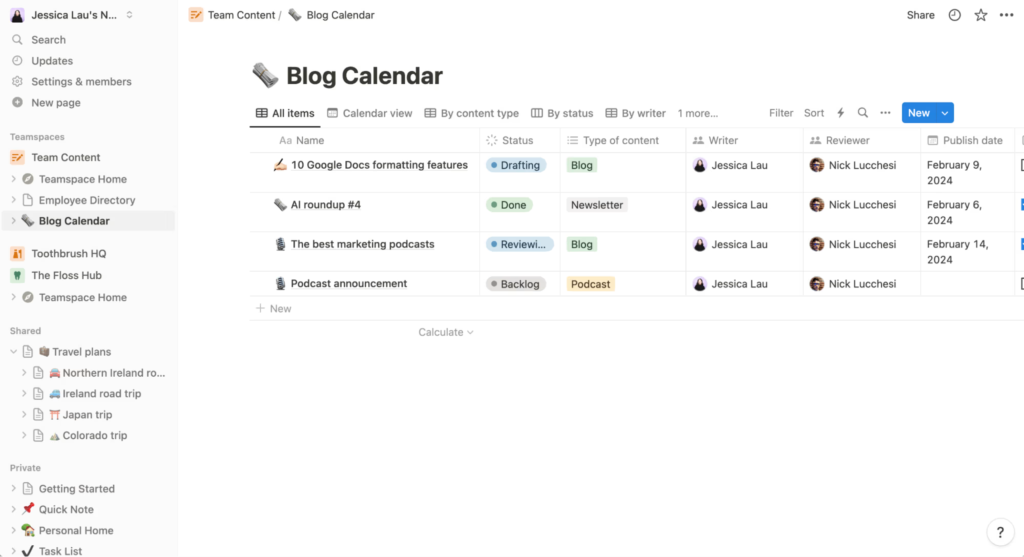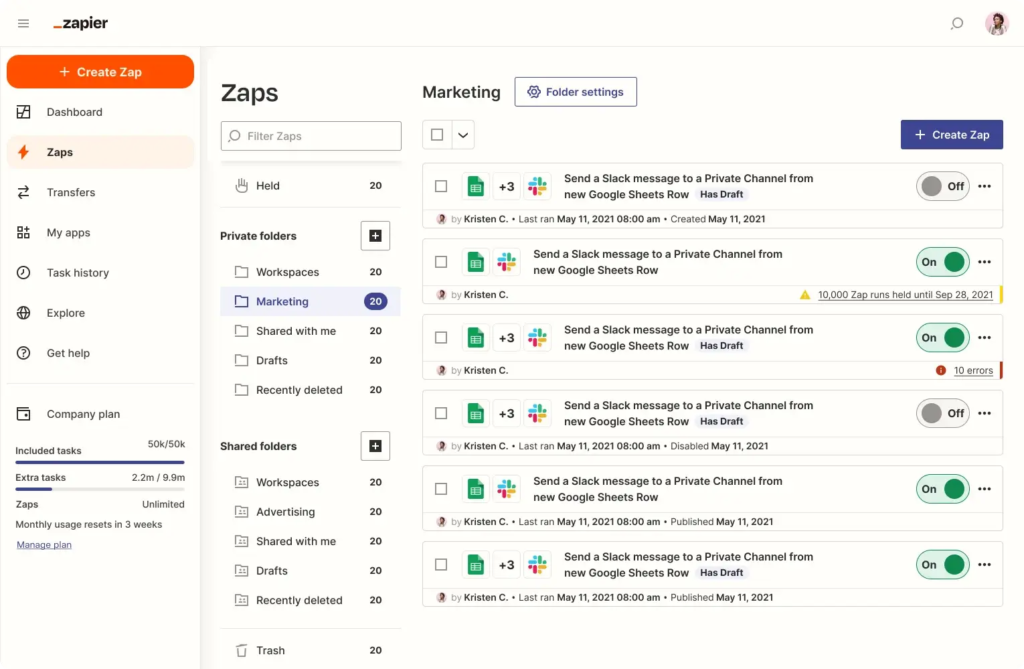Are you feeling overwhelmed with tasks, struggling to keep up with emails, or just looking for smarter ways to work?
Artificial Intelligence (AI) is revolutionizing the way we handle productivity, automation, and content creation. Whether you’re a business owner, freelancer, student, or executive, the right AI tools can save you hours of work every week.
In this guide, we’ll dive deep into 5 of the best AI productivity tools available in 2025, exploring their key features, real-world use cases, and how they compare to alternatives.
1. Notion AI – The Best AI Tool for Organization & Note-Taking
Managing information overload has become a challenge for students, professionals, and businesses alike. Notion AI, an extension of the widely popular Notion platform, helps users cut through the clutter by providing AI-powered summaries, automated content generation, and smart organization tools.
Imagine having pages of meeting notes, project plans, or research documents and needing a quick summary. Instead of manually sifting through information, Notion AI can instantly extract key points, highlight action items, and even draft follow-up tasks. This makes it an invaluable tool for anyone who regularly deals with large amounts of information.

Businesses use Notion AI to automate workflow documentation, generate content for project proposals, and structure complex databases without manual effort. Students can rely on it to summarize lectures, generate study guides, and streamline research notes. With seamless integration into the Notion ecosystem, it becomes an all-in-one productivity powerhouse.
However, while Notion AI is fantastic for knowledge management and organization, it might not be ideal for those who need a simpler, distraction-free note-taking app. Evernote AI offers a more minimalist approach, and Obsidian focuses on knowledge linking rather than AI-powered automation.
🚀 Try Notion AI for Free ➝
2. Grammarly – The Best AI Writing Assistant for Clarity & Professionalism
Effective communication is essential in every aspect of life, from writing professional emails to crafting compelling blog posts. Grammarly has evolved beyond basic spell-checking, offering real-time AI-powered suggestions that improve tone, clarity, engagement, and even structure.
For business professionals, Grammarly ensures that emails sound polished and professional, reducing miscommunication in the workplace. Writers benefit from advanced sentence rewrites and AI-driven readability improvements, while students can use the plagiarism checker to ensure originality in academic work.
What sets Grammarly apart is its ability to tailor writing feedback based on context. Whether you’re drafting a legal document, casual email, or persuasive marketing copy, Grammarly’s AI adapts suggestions to match the intent and audience. While basic grammar and spelling correction are available for free, the premium version unlocks more advanced tools like tone detection, plagiarism scanning, and sentence rewrites.

Compared to Hemingway Editor, which primarily focuses on readability, Grammarly provides more comprehensive AI-driven writing assistance. Similarly, while ChatGPT can generate content from scratch, Grammarly excels at refining and improving pre-written text.
🚀 Get Grammarly Premium ➝ [Insert Affiliate Link]
3. ChatGPT – The Best AI Assistant for Content Creation & Problem Solving
One of the most revolutionary AI tools in recent years, ChatGPT has transformed the way we approach brainstorming, research, and content creation. Unlike traditional search engines that provide scattered information, ChatGPT delivers cohesive, well-structured answers in conversational form.
For content creators and marketers, ChatGPT is a game-changer, helping generate blog outlines, social media captions, ad copy, and even full-length articles in seconds. Instead of spending hours researching and drafting, users can ask ChatGPT to summarize complex topics, suggest creative ideas, or refine existing content.
Developers also benefit from ChatGPT’s ability to debug code, provide explanations for programming concepts, and generate scripts for automation. Meanwhile, businesses integrate ChatGPT into their customer service workflows to provide instant, AI-generated responses to common inquiries.
While incredibly powerful, ChatGPT does have limitations. It lacks real-time internet access unless you have a ChatGPT Plus subscription with browsing enabled, meaning its knowledge is not always up to date. Jasper AI is a strong alternative for those looking for AI-driven marketing copy, while Google’s Gemini offers better real-time search integration.
4. Zapier – The Best AI Tool for Workflow Automation
If you’ve ever found yourself wasting time on repetitive tasks like copying data between spreadsheets, sending follow-up emails, or manually updating customer records, Zapier is the ultimate solution. This AI-powered automation platform connects thousands of apps and allows users to create custom workflows (called Zaps) that handle tasks automatically.

For example, let’s say a new lead fills out a contact form on your website. Instead of manually adding them to your CRM and sending an email response, Zapier can automatically capture the lead’s information, store it in a database, and trigger an email sequence—all without any human intervention.
Marketing teams use Zapier to schedule social media posts, track analytics, and automate email campaigns, while HR departments streamline onboarding processes by automating document submissions and notifications.
Compared to other automation tools like Make (formerly Integromat), Zapier stands out for its no-code approach and massive library of app integrations. However, more complex automation may require premium access.
🚀 Boost Your Workflow with Zapier ➝
5. Otter.ai – The Best AI Tool for Meeting Transcriptions & Note-Taking
In an era where remote work and virtual meetings dominate, capturing key discussion points is critical. Otter.ai is a powerful AI-driven transcription tool that converts spoken conversations into text in real-time, making note-taking effortless.
Imagine attending a Zoom meeting and missing a crucial point—Otter.ai not only records conversations but also creates AI-generated summaries, highlights key action items, and provides fully searchable transcripts. This makes it ideal for business teams, students, journalists, and content creators who need accurate meeting notes.
Unlike generic transcription tools, Otter.ai adapts to different speakers, learns unique terminology, and syncs with calendar apps for automatic meeting transcriptions. It integrates seamlessly with platforms like Zoom, Microsoft Teams, and Google Meet, ensuring no details are lost.
While Rev.com provides more human-verified accuracy, Otter.ai’s real-time AI transcription and affordability make it the best option for most users.
🚀 Try Otter.ai for Smarter Meeting Notes ➝
Final Thoughts: Which AI Tool is Best for You?
AI tools have rapidly evolved into essential productivity boosters, helping people work smarter, faster, and more efficiently. Whether you’re looking to improve writing, automate workflows, or streamline content creation, there’s an AI-powered solution tailored for your needs.
✨ Need better writing? Try Grammarly.
✨ Want to automate workflows? Use Zapier.
✨ Struggling with content creation? ChatGPT is your best bet.
Which AI tool do you think will make the biggest impact on your workflow? Let us know! 🚀



Leave a Reply